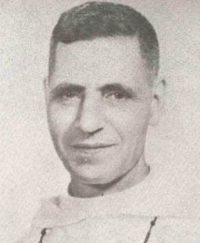It was a day of looting. The year 1941 passed and was buried in the midst of a tragic, uncertain and restless silence. The new year was greeted by the eerie illuminations of a conflagration which is growing bigger and bigger each time.
First thing in the morning, I was informed that the Japanese were entering Manila, and Fr. Provincial advised all the Fathers who were sheltered outside Manila or in private homes to stay in the University seminary. I moved to the University together with most of the Fathers from Letran.
There is great fear and confusion among the civilian populace. Many are afraid that the Japanese will enter the city and indulge in killing and burning. A number of families have sought refuge in the University, placing themselves under our custody. The same situation now prevails in all the convents.
The looting today has taken on alarming proportions. It all started innocently, when the American military headquarters, not being able to bring along their huge amounts of provisions, opened the doors of their storerooms and invited the people to cart away what they could. Then the Chinese, who also wanted to evacuate, began underselling their wares. Those who were not able to loot yesterday broke into stores abandoned by their owners, tearing down doors and destroying padlocks.
In Intramuros, great multitudes milled around the doors of stores which they tried to force open. People in the streets carried boxes or bags of foodstuff, machines or pieces of furniture or a thousand other things. Some came in calesas, cars or wagons to be able to carry more. For one peso, they would sell a whole case of milk or canned goods. For five pesos, a typewriter or an electric stove or gas range. Fortunately there were no indications of violence, although they burned some stores.
The more sober portion of the populace attributed these incidents to two things: first, the bad precedent set yesterday by the Americans when they gave away the contents of their warehouses; and second, the fact that the police and the constabulary have been disarmed so that the Japanese, finding them so, would not have any reason to be violent. The police therefor are powerless in protecting properties, and the looters have lost respect for them. However, it is sufficient for someone to shout. “Here comes the Japanese!” and everybody would scamper away like rats. As a matter of fact, there are many who actually await the arrival of the Japanese to put an end to such pillage, as nobody feels secure anymore.
Manila has taken on the demeanor of a conquered city, having yielded, not to the invaders but to the plunderings of its own citizenry.
The Japanese were delayed in arriving due to the blown-up bridges and railroad tracks left in the wake of the retreating Americans. The Americans proved themselves better at handling dynamites rather than guns. Soldiers who came to Manila from the front were ordered to reassemble at Bataan and Pampanga after a brief and ineffective resistance at La Union, where the invading forces landed.
The declaration of Manila as an open city was a humanitarian act of the High Command, which saved the whole area from major destruction. But the desertion of Greater Manila—which was created by President Quezon by annexing to it the suburban cities and towns before he left the capital—without police protection, with the burning of so many depots and the fires which spread to so many private homes, were manifestations of the confusion and lack of foresight of the exiled government—a fact which completed the demoralization of the civilian population.
The conflagrations have continued to spread. Large columns of smoke—about 20 of them—extending to some twenty kilometers in length, together with the looting of stores and warehouses converted this first night of 1942 into an anarchical milieu, giving Manila the countenance of a city left to the vandalism and fury of an army of barbarians.
